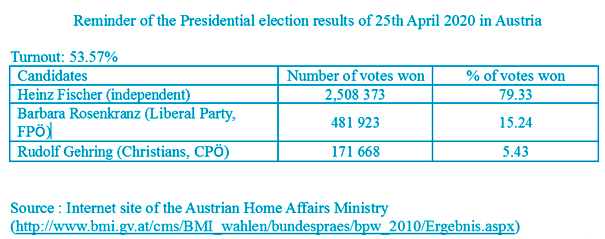Analysis
Elections in Europe
Corinne Deloy
-

Available versions :
EN

Corinne Deloy
6.3 million Austrians aged 16 and over are being called to ballot on 24th April next to appoint the next president of the Republic. Six people are officially running for the post:
• Alexander van der Bellen (Greens, DG), 72 years old, former spokesperson for the ecologist party (1997-2008);
• Rudolf Hundstorfer (Social Democratic Party, SPÖ), 64 years old, former Social Affairs and Consumer Protection Minister (2008-2016);
• Andreas Khol (People's Party, ÖVP), 74 years old, former leader of the National Council (Nationalrat), lower chamber of the Austrian Parliament (2002-2006);
• Norbert Hofer (Liberal Party, FPÖ), 45 years old, present third leader of the National Council;
• Irmgard Griss, 69 years old, former judge at the Supreme Court who is standing as an independent;
• Richard Lugner, 83 years old, businessman in the construction in industry, is standing as an independent. He is running for the second time for the Presidential office having already attempted in 1998 (he then won 9.91% of the vote).
According to the polls none of the candidates are due to win outright on 24th April. If this does in fact happen then a second round will take place on 22nd May.
An extremely uncertain battle
According to the most recent Gallup poll, published on 24th March last, ecologist Alexander van der Bellen is due to come out ahead in the first round with 25% of the vote. He is due to take a slight lead over Norbert Hofer who is due to win 21% of the vote; Irmgard Griss is credited with 19% of the vote; Rudolf Hundstorfer is due to win 17% of the vote and Andreas Khol 13%. Richard Lugner is only due to win 5% of the vote.
It is not guaranteed that the candidates from the two parties in the coalition in office - the Social Democratic Party (SPÖ) and the People's Party (ÖVP) will take part in the second round. Neither has succeeded in rallying more than 2/3 of party supporters to their names. Many of those close to the SPÖ say they are prepared to vote for Alexander van der Bellen, whilst many ÖVP supporters might vote for independent candidate Irmgard Griss. For the first time since the end of the Second World War at least one of the two candidates of the parties in office might not take part in the second round. This defeat would be historic and disastrous for the party involved and for their respective leaders i.e. the present Chancellor Werner Faymann (SPÖ), or Reinhold Mitterlehner (ÖVP).
Refugees and more widely migration are the themes that are due to dominate the electoral campaign, issues that might favour the FPÖ candidate Norbert Hofer. Austria, which lies on one of the main routes linking Turkey - where most refugees come from - with Germany - where they hope to end their journey - is the country that has hosted the greatest number of refugees in proportion to its population. The government's policy has changed however as the weeks have gone by: Chancellor Werner Faymann's coalition reintroduced border controls (at the end of January Vienna completed the construction of a four metre high fence running along the 3.7 km border with Slovenia, the first wall to be erected between two Schengen area member states), it also introduced a quota of migrants who are allowed to transit across Austria per day (3,200) and reduced the social aid that refugees are given along with their right to family reunion.
The Presidential Office
In Austria the presidential office is mainly an honorary one. The head of State appoints the Prime Minister and all of the government. He can dissolve the government as well as the National Council, the lower chamber of Parliament on the government's request, powers which no President of the Republic has yet used. In 1959 head of State Adolf Schärf (SPÖ) refused to appoint a coalition government rallying conservatives from the ÖVP and members of the Independents' Association (VdU), a far right party comprising, amongst others, former members of the Nazi Party, finally approving a coalition government comprising the ÖVP and the SPÖ.
Head of the armies, the President of the Austrian Republic is elected for a six year term and his mandate is renewable only once. All candidates running for the presidency must be aged at least 35 and win a minimum of 6,000 voters' signatures or have the support of at least five members of the National Rat in order to be able to stand. Any candidate winning more than half of the vote is elected in the first round of the election. If there is a second round a new candidate can replace one of those who ran in the first round.
We should recall that in Austria it is obligatory to vote in four of the nine of the country's Länder: Tyrol, Carinthia, Styria and Vorarlberg.

On the same theme
To go further
Elections in Europe
Helen Levy
—
24 February 2026
Elections in Europe
Helen Levy
—
10 February 2026
Elections in Europe
Corinne Deloy
—
20 January 2026
Elections in Europe
Corinne Deloy
—
13 January 2026

The Letter
Schuman
European news of the week
Unique in its genre, with its 200,000 subscribers and its editions in 6 languages (French, English, German, Spanish, Polish and Ukrainian), it has brought to you, for 15 years, a summary of European news, more needed now than ever
Versions :


